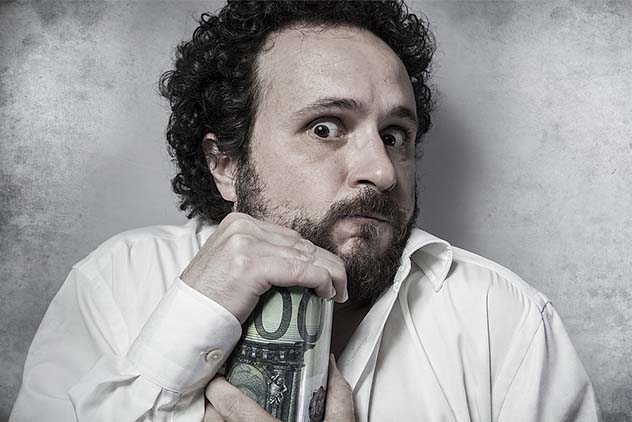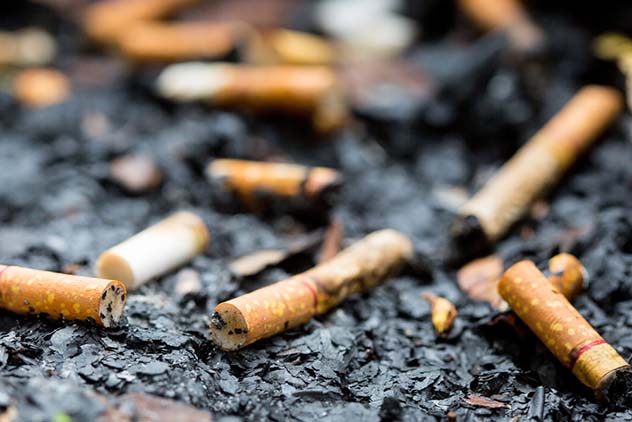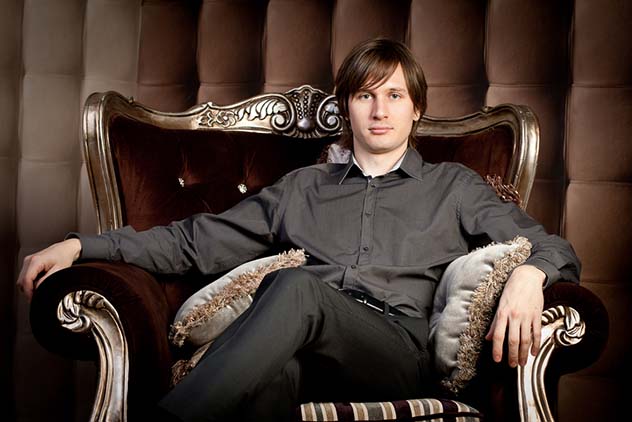 Mysteries
Mysteries  Mysteries
Mysteries  History
History 10 Surprising Stories About the Texas Rangers
 Humans
Humans 10 Philosophers Who Were Driven Mad by Their Own Theories
 Miscellaneous
Miscellaneous 10 Video-Game-Worthy Weapons and Armors from History
 Weird Stuff
Weird Stuff 10 Psychics Who Accurately Predicted Wartime Events
 The Arts
The Arts 10 Pieces of Art Inspired by a Broken Heart
 Health
Health 10 Science Fiction-Sounding New Medical Treatments
 History
History 10 Surprising Facts About the Father of Submarine Warfare
 Space
Space Ten Astonishing New Insights into Alien Worlds
 Weird Stuff
Weird Stuff 10 Bizarre Summer Solstice Rituals Still Practiced Today
 Mysteries
Mysteries Top 10 Haunting Facts About the Ghost Ship MV Alta
 History
History 10 Surprising Stories About the Texas Rangers
 Humans
Humans 10 Philosophers Who Were Driven Mad by Their Own Theories
Who's Behind Listverse?

Jamie Frater
Head Editor
Jamie founded Listverse due to an insatiable desire to share fascinating, obscure, and bizarre facts. He has been a guest speaker on numerous national radio and television stations and is a five time published author.
More About Us Miscellaneous
Miscellaneous 10 Video-Game-Worthy Weapons and Armors from History
 Weird Stuff
Weird Stuff 10 Psychics Who Accurately Predicted Wartime Events
 The Arts
The Arts 10 Pieces of Art Inspired by a Broken Heart
 Health
Health 10 Science Fiction-Sounding New Medical Treatments
 History
History 10 Surprising Facts About the Father of Submarine Warfare
 Space
Space Ten Astonishing New Insights into Alien Worlds
 Weird Stuff
Weird Stuff 10 Bizarre Summer Solstice Rituals Still Practiced Today
Top 10 Surprising Facts About Rich People
Nobody conforms 100 percent to their social group. But a blanket view can cover the pack’s traits in broad strokes. The “rich people” blanket comes with odd beliefs and habits. From thinking that the poor are happier than them to smoking their cigarettes differently, the world of the wealthy is certainly not boring.
See Also: 10 Things Rich People Do That You Don’t
10 Rich Kids Are Higher-Risk For Drugs

There is a misconception that addiction is a mark of the poor. Drugs and alcohol affect people from all backgrounds but affluent kids are more at risk. One might be forgiven for questioning this. What do they have to worry about? They have their ponies and large allowances. Outsiders often assume a rich kid popping Ecstacy is acting out of boredom. A 2017 study found that was not the case. The real reason is sad and has devastating consequences.
For years, the researchers followed hundreds of students beginning with their high school years. Each pupil had wealthy parents with a high standing and their schools insisted on high achievements. As it turns out, the pressure was too much. Drugs and binge drinking became a coping mechanism. When they grew up and started their own lives, the pressure vanished but not the drug use. It became worse. By age 26, their addictions were three times higher than the national average.[1]
9 They Are Less Giving

In 2018, a group played for real money. They gathered at a London university and were divided into “higher status” and “lower status” players. This reflected how much money each person received at the game’s beginning.
The game had a simple goal. Each player donated money to a group kitty. They were free to decide how much. After a round or two, the money was split between everyone. A player’s wealth could grow either through chance or hard work. Those who earned their money proved to be the Scrooge McDucks of the group. They added the least.
Things were not as selfish as they appeared. The poor participants had less to lose. Adding more money to the kitty was also their way of encouraging the rich guys to do the same. This increased their chances for a bigger return. However, the big fish refused to bite. They had more to lose and those who earned their wealth had even less reason to just give it away.[2]
8 They Waste Cigarettes

In 2008, students in New Zealand collected evidence for a study. They looked a little strange while doing so. The group visited six neighborhoods in Wellington and picked up over 3,500 cigarette butts. While the environment thanks them, the real aim was to see whether income changes the way people smoke.
One type of cigarette showed the same thing, regardless of the suburb it came from. Rich and poor smoked roll-your-owns down to the same length. But cigarettes manufactured in factories or tailor-made for an elite customer betrayed the income of the smokers.
The remaining tobacco was scooped from the butts and measured. Poorer smokers, with less to spend, destroyed their cigarettes down to the butt. On the other hand, the wealthier suburbs discarded their cigarettes with 75 percent more unused tobacco.[3]
7 They Are More Dishonest

The wealthy have special stalkers. These benign creepers are psychologists and they have been following the rich for decades. The reason? To see what privilege does to the human mind. The general view is that it grooms people to enjoy the benefits of dishonesty.
Researchers took their notebooks to a busy intersection. The four-way was governed by right-of-way. The team noted the model of the cars that cut off other drivers. Road hogs appeared from both sides of the social fence. But new, expensive vehicles were four times more likely to ignore the fact that it was not their turn to drive. The researchers then moved their gaggle to a crosswalk where pedestrians had the right-of-way. Every cheap or old car stopped. Half of the expensive cars ignored them. Technically, they broke a law. Drivers must stop for people who want to cross.
Elsewhere, the statistics are even starker. The wealthy cheat more on their spouses, their taxes and at games. They also have the moolah to buy stuff but are more likely to shoplift.[4]
6 Rich Women Choose Older Men

In the past, wealth was skewed in men’s favor. For this reason, women chose providers and men placed more importance on attractive looks. Both preferred a younger partner. As women become richer, they bring their own financial security to the relationship. They no longer look to men as providers but how good-looking they are. Moreover, they want older men. This trend’s popularity even coined a name—the George Clooney Effect.
This crushed the misconception that wealthy women act like men. In other words, prefer a toyboy as a partner. This female shift also changed how elite men like their women. According to a recent survey, they prefer even younger girls than before.[5]
10 Obscene And Ridiculous Things The Rich Do With Their Money
5 Their Old Age Is Longer And Healthier

The best perk of wealth could be a longer life. Apart from seeing 100 years up close, the upper-class elderly also enjoy more years of being physically independent. Scientists stumbled upon this surprising fact when they compared the health of older adults in the US and England.
Both countries showed the same thing. After age 50, rich women could expect 33 more disability-free years and 31 for men. They could cook for themselves and get out of bed, things the poorest communities start struggling with nine years earlier.
There are islands where people grow old without a fat bank account. This proves that longevity is a complex cocktail of genes, attitude, diet, and exercise. The drastic difference noticed in the US-England survey added wealth as another definite factor. It reduces stress, which is one of the biggest problems for health. People with funds can also travel to hospitals and pay for treatments that maintain a good quality of life.[6]
4 Wealthy Parents Cheat For Their Kids

In 2019, the authorities closed down a scam. Before the feds got wind of the crime, times were profitable. Parents paid a stiff bribe to guarantee a place at elite universities for their children. Altogether, nearly $6.5 million were paid to the scammers. Two of the parents caught with their hand in the cookie jar were actresses Lori Loughlin and Felicity Huffman.
Moral psychologists were not surprised. The wealthy often live through their children’s achievements. Additionally, the rich are increasingly experiencing class angst. More people are gaining access to their exclusive world and seeing the lower-income kids swarm elite institutions is a bitter pill to swallow.
Many elites believe they are better than everyone else. They deserve the first slice of the pie. This entitlement drives their unethical choices, which is then justified in some way. In the bribery case, the parents used the excuse that they were “helping” their child.[7]
3 Some Believe Poor People Are Happier

People with higher incomes have a curious blind spot. Some think that lower-income individuals are actually happier. Anyone with an empty piggy bank knows the opposite is true. To be fair to the blind spot, it was pulled from a small survey. The 2007 questionnaire excluded men for some reason too. But the bottom line was that most of the wealthier women believed that the rest of the population experienced less stress. The reason? The top earners viewed themselves as busier.
This is a very limited view of what causes stress. But the survey was backed (to a degree) by other social experiments. They suggested the rich sometimes prefer a rosy view of reality to feel less guilty about their privileges. The less moral outrage they feel, the less motivation there is to help others. This could explain why people with the financial clout to change the world do nothing.[8]
2 They Pay Less Attention To Others

Most people tend to feel invisible around the rich and powerful. As it turns out, this feeling is not their imagination. The upper class has a habit of ignoring those around them. More specifically, anyone who is beneath them socially and financially.
In 2016, scientists lied through their teeth to volunteers. In two separate experiments, they were told that they were either testing new technology or playing a memory game. The fibbing was necessary. They could hardly tell the richer volunteers that they were being studied for this unusual trait.
One group wore smart-glasses that recorded everything they saw. While being under the impression of testing the device, each volunteer walked down a street. The affluent ones spend less time looking at passersby from lower classes. Higher-class participants also struggled with the memory game because they failed to pay attention to images showing faces.
The upper crust might not realize how often they do this. Humans pay attention to threats or potential threats. To the elite, the lower classes are not a danger nor rewarding. In other words, nothing interesting to look at.[9]
1 They Overestimate Their Worth

There is nothing wrong with having self-confidence. But people from affluent families might overestimate their abilities. Even worse, others believe them. The consequences only serve the perky rich person. They get ahead in job interviews despite that other people are equally capable. Those who fall for their confidence might also later realize that they hired the wrong person.
This was the conclusion of scientists who studied loan applications and job interviews. Both included tests where wealthier applicants thought they did great. They actually performed average. Those with lower incomes were more in tune with their own scores—but it failed to give them the edge.
As mentioned earlier, the elites’ confidence impressed the money-lenders and hiring agents. This is a problem. Such people offer better chances to others. If they fall for overconfidence in applicants who believe they rock, then this could explain why those with class and confidence issues fall behind, despite being as just as capable.[10]
10 Inspirational Rags-To-Riches Stories








